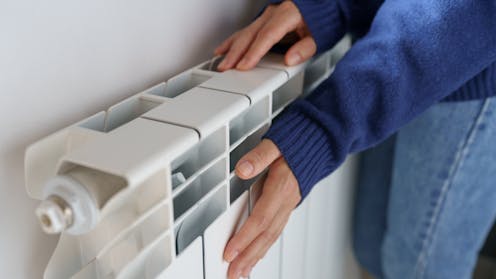How the UK’s cold weather payments need to change to help prevent people freezing in winter
- Written by Thomas Longden, Senior Researcher, Urban Transformations Research Centre, Western Sydney University

The UK government recently expanded the warm home discount[1] by removing restrictions that had previously excluded many people who can’t always afford to heat their homes[2]. Now, the payment of £150 will be received by 2.7 million more households than last winter.
The UK government has also reversed its decision to limit winter fuel payments[3] to only the poorest pensioners. This could benefit up to 9 million people[4].
The UK government has two other mechanisms for reducing heating costs over winter. The warm home discount and winter fuel payment are both one-off payments that help people pay their heating bills. The cold weather payment aims to support people during spells of very cold weather[5].
Recipients of specific means-tested benefits in England, Wales and Northern Ireland automatically receive £25 after cold weather occurs in their region. Another policy applies in Scotland, where some people get a single winter heating payment[6].
While these changes to the winter fuel payment and warm home discount are welcome, the cold weather payment[7] has long been seen as an outdated, old-fashioned scheme[8] in need of change. For example, it is paid after cold weather happens. Our[9] research[10] indicates that it can be improved by changing this.
The wide use of smart meters means that researchers like us can now produce data-driven studies that improve our understanding of energy use and expenditure during cold weather. Our recent[11] studies[12] of prepayment meter customers’ energy use indicate ways to improve the cold weather payments.
Analysis of electricity and gas smart-meter data[13] from 11,500 Utilita Energy[14] prepayment customers showed that 63% of households self-disconnected from energy supply at least once a year. In this study, published in Energy Research & Social Science, we found that more homes self-disconnected from gas during cold periods than at other times. There was no evidence to show that the cold weather payment as presently designed reduced this risk.
Also using smart meter data from energy company Utilita Energy[15], a recent study[16] published in the journal Energy Economics shows that prepayment gas customers in regions with high fuel poverty tend to struggle at temperatures below −4°C. Below this temperature, prepayment gas customers need to top up more often and with higher amounts. People using prepayment tend to top-up their credit in advance of cold weather[17].
In colder weather, more people use emergency credit and disconnect from power more often[19]. Emergency credit is provided by the utility as a short-term loan. Self-disconnections occur when the household has no credit left and they have no energy supply.
The government’s payment is triggered when the average temperature falls below 0°C for seven consecutive days. As this metric is not reported by news media or meteorology services, it’s hard to know when the cold weather payment will be received. The easiest way to find out if a payment will be made, after cold weather, requires people to enter their postcode at a Department for Work and Pensions website[20].
If people are unsure if severe weather is forecast, they may not increase their top-up in advance. They may, however, self-ration or limit energy use[21] to save money.
The cold weather payment is only paid once even when there are multiple periods of cold. This “overlap penalty”[22] severely affects those living in northern England and particularly Yorkshire, which is a colder region where cold weather spells are more common.
The payment should be made in advance of cold weather, and utility companies could pay it directly to customers who have smart meters. Credits could be applied for those using other types of meters. This is likely to reduce self-disconnections and self-rationing during very cold nights.
Payments should be triggered by the minimum night-time temperature. The temperature measure used at present is confusing and the money is not paid until up to two weeks after extremely cold weather[23], which is problematic for those on tight budgets.
To better match the support needed during cold weather, the amount paid should be increased to £10 a day[24] for every day that minimum temperatures are forecast to be below −4°C. This would improve energy security for people in England, Wales and Northern Ireland.
A policy will only be effective when it is clearly communicated and understood by those it applies to. To prevent self-rationing, people need to know that payment support has arrived, otherwise they may hesitate to turn up the heating on the coldest days of winter, with all the risks that involves.
References
- ^ warm home discount (www.gov.uk)
- ^ to heat their homes (theconversation.com)
- ^ winter fuel payments (www.gov.uk)
- ^ up to 9 million people (www.bbc.com)
- ^ support people during spells of very cold weather (assets.publishing.service.gov.uk)
- ^ winter heating payment (www.mygov.scot)
- ^ cold weather payment (www.gov.uk)
- ^ an outdated, old-fashioned scheme (publications.parliament.uk)
- ^ Our (doi.org)
- ^ research (doi.org)
- ^ recent (doi.org)
- ^ studies (doi.org)
- ^ Analysis of electricity and gas smart-meter data (doi.org)
- ^ Utilita Energy (utilita.co.uk)
- ^ Utilita Energy (utilita.co.uk)
- ^ recent study (doi.org)
- ^ top-up their credit in advance of cold weather (doi.org)
- ^ Daisy Daisy/Shutterstock (www.shutterstock.com)
- ^ more people use emergency credit and disconnect from power more often (doi.org)
- ^ Department for Work and Pensions website (coldweatherpayments.dwp.gov.uk)
- ^ limit energy use (www.citizensadvice.org.uk)
- ^ “overlap penalty” (doi.org)
- ^ up to two weeks after extremely cold weather (assets.publishing.service.gov.uk)
- ^ increased to £10 a day (www.eci.ox.ac.uk)
- ^ Get a weekly roundup in your inbox instead. (theconversation.com)
- ^ Join the 45,000+ readers who’ve subscribed so far. (theconversation.com)







